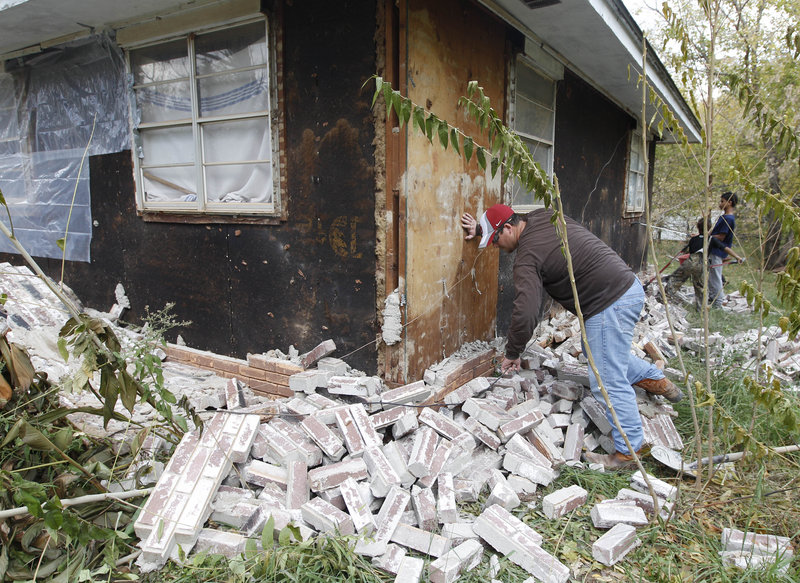WASHINGTON — Thousands of times every day, drilling deep underground causes the earth to tremble. But don’t blame the surprise flurry of earthquakes in Oklahoma on man’s thirst for oil and gas, experts say.
The weekend quakes were far stronger than the puny tremors from drilling – especially the controversial practice of hydraulic fracturing. The weekend quakes didn’t have the mark of man. They were a force of nature.
Hydraulic fracturing, called fracking, involves injecting millions of gallons of water, sand and chemicals deep underground to break up rock. While that may sound like it could cause an earthquake, experts say the process doesn’t pack nearly the punch of even a moderate earthquake.
3,800 TONS OF TNT POWER
The magnitude-5.6 quake that rocked Oklahoma three miles underground had the power of 3,800 tons of TNT, which is nearly 2,000 times stronger than the 1995 Oklahoma City bombing.
The typical energy released in tremors triggered by fracking, “is the equivalent to a gallon of milk falling off the kitchen counter,” said Stanford University geophysicist Mark Zoback.
In Oklahoma, home to 185,000 drilling wells and hundreds of injection wells, the question of man-made seismic activity comes up quickly. But so far, federal, state and academic experts say readings show that the Oklahoma quakes were natural, following the lines of a long-known fault.
“There’s a fault there,” said U.S. Geological Survey seismologist Paul Earle. “You can have an earthquake that size anywhere east of the Rockies. You don’t need a huge fault to produce an earthquake that big.”
But there’s a reason people ask if the quakes are man-made rather than from the shifting of the Earth’s crusts.
In the past, earthquakes have been linked to energy exploration and production, including from injections of enormous amounts of drilling wastewater or injections of water for geothermal power, experts said.
They point to recent earthquakes in the magnitude 3 and 4 range – not big enough to cause much damage, but big enough to be felt – in Arkansas, Texas, California, England, Germany and Switzerland. And back in the 1960s, two Denver quakes in the 5.0 range were traced to deep injection of wastewater.
Still, scientists would like to know if human activity can trigger a larger event. The National Academy of Sciences is studying the seismic effects of energy drilling and mining and will issue a report next spring.
“This is an area of active research,” said Cornell University seismologist Rowena Lohman. “We’re all concerned about this.”
OIL FLOWS ALONG FRACTURES
One issue is that areas that are prone to earthquakes are also places where oil and gas flow along fractures, experts said. In some studies, scientists have taken earthquake data and, like detectives, tracked its causes to deep injections of lots of liquid under high pressure, such as ones that peaked at magnitude 3.3 at the Dallas-Fort Worth airport in 2008 and 2009, said USGS geophysicist William Ellsworth. The Switzerland quake was in the city, Basel, so it did cause damage, he and others said.
“How big an earthquake might we trigger? That is an open question at this point,” Ellsworth said. “We do know we can trigger magnitude 5 earthquakes.”
When lots of liquid is injected into the ground, it changes the stress and pressure in a place that probably already was a fault, said Oklahoma Geological Survey seismologist Austin Holland.
Putting the liquid in is similar to injecting water between two adjacent bricks, it allows them to slide more easily and “the water under pressure is helping push the bricks apart ever so slightly,” Holland said.
Holland, who has documented some of the biggest shaking associated with fracking, compared a man-made earthquake to a mosquito bite. “It’s really quite inconsequential,” he said.
Hydraulic fracturing has been practiced for decades, but it has grown rapidly in recent years as drillers have learned to combine it with horizontal drilling to tap enormous reserves of natural gas and oil in the United States.
Send questions/comments to the editors.



Success. Please wait for the page to reload. If the page does not reload within 5 seconds, please refresh the page.
Enter your email and password to access comments.
Hi, to comment on stories you must . This profile is in addition to your subscription and website login.
Already have a commenting profile? .
Invalid username/password.
Please check your email to confirm and complete your registration.
Only subscribers are eligible to post comments. Please subscribe or login first for digital access. Here’s why.
Use the form below to reset your password. When you've submitted your account email, we will send an email with a reset code.